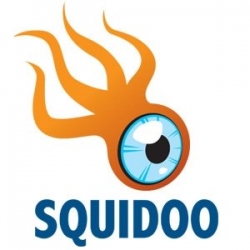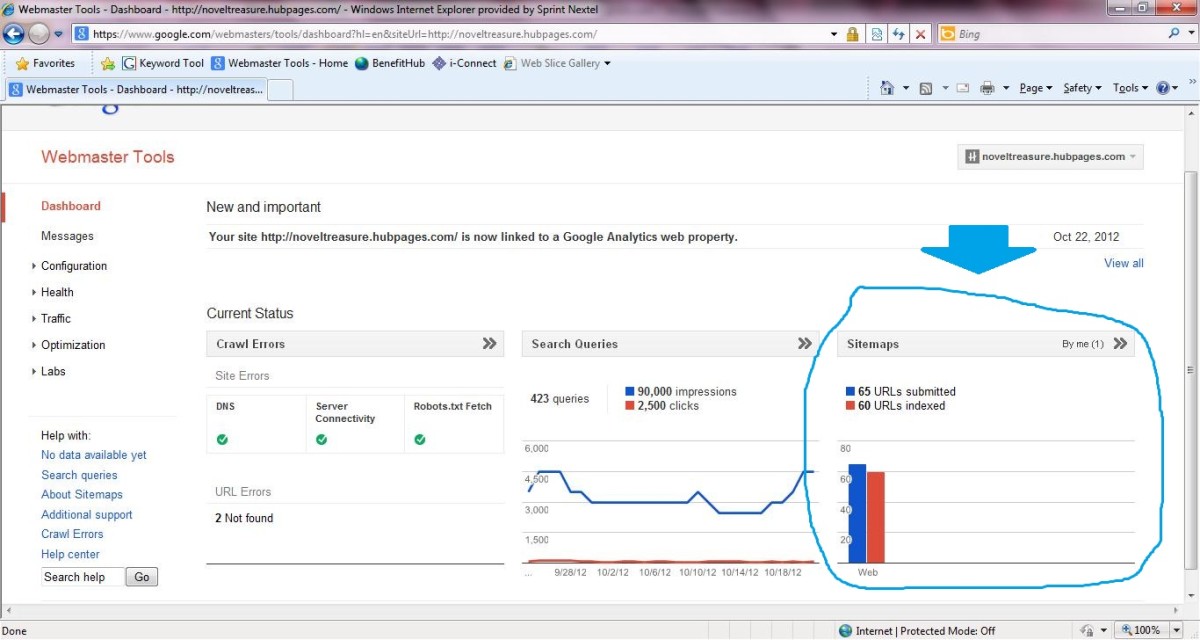Is Squidoo better for SEO than Hubpages?
BIG EDIT: I will keep this for historical purposes and amusement value.
- Squidoo is no more, or rather it will cease to exist in October!
- It got mega slapped by google for publishing shower curtain content. Nothing the team did (like banning shower curtains) has any effect.
- HP appears to have acquired Squidoo content!
I guess this definitively answers the question of which is better for SEO!

What is better for SEO squidoo or hubpages?
It is a little bit early for me to make definitive statements about which is better for passive income, I have been writing hubs for 5 weeks and squid lenses for 3 weeks, so before you start shouting at me, this is just exploring some ideas and observations, with no definite conclusions at the end. If you think I am an idiot, you are most welcome to show me the error of my ways.
For the record my hubpage income so far has been negligible and my squidoo income is zero, so there is really no data to compare. The question I am asking, but not really answering, is if you did published the same content, got the same backlinks (or no backlinks as the case might be) on squidoo or hubpages, which would give you a higher rank on google searches for your main keyword, and hence more organic traffic, and hence more lovely coinage?
Squidoo vs HubPages first impressions
Squidoo is a revenue sharing site, in many respects similar to HubPages, in fact since squidoo was there first, I think we should really say that HubPages are similar to Squidoo. Of course there are differences in format and certainly differences in the way the revenue is shared, but I will not write extensively about that now. I am really interested in whether Squidoo or HubPages give you better a better SEO platform to ensure proper respect from Google, which is so sadly missing from many of us producers of fantastic web content. Whether you prefer the format of one site to another, is largely a matter of personal taste.
I have to say that I found the squid monsters and other strange orange creatures which kept popping up randomly with insanely cheerful messages, like little pixel amphetamine addicts, somewhat unsettling at first, although I am used to them by now, and find them less irritating. Many Squidoo lenses seem to be geared towards selling affiliate products like this one featuring tree frog posters and merchandise, that I made. I find being able to put affiliate links from allposters very useful, it's great for adding beautiful images to the page without worrying about copyright violation.

Keyword research and Market Samurai
I started thinking about all of this when I decided to do some keyword research. I had quickly become frustrated by the complete contempt Google was showing all my internet outpourings, and decided that perhaps researching the topic I wanted to write on, with a view of how likely it was to rank in google might not be a bad idea. I had tried doing keyword research using Google Adwords tools, but the data from it was a bit too 'raw' for a newby like me. Also I found it quite difficult to obtain further information that I felt I really needed to find out if my hub or lens on a particular subject was going to be consigned to page 326 of Google results.
At a simplistic level, how much search engine traffic you will get will depend on two things, how much demand there is for a particular word (how many people search for it), and how good the already-existing supply you will be competing with is. The free adwords tool was quite good at providing information about the demand side of thing, how many searches there were for a particular keyword per month, but not particularly forthcoming about the competition. It would tell you that the competition was 'low', 'medium' or 'high', based on how many search results there were for a particular word, but nothing else. There might be ways of squeezing more data from it, which i haven't figured out yet, but I was too impatient to try. Many people had written about using Market Samurai for keyword research, and since there is a one week free trial, I decided to try it.
Market Samurai and my SEO competition
Market Samurai gives you the same information as Adwords keyword tool, in a more user friendly fashion. You enter in a 'seed' keyword, it will generate a list of suggestions, related keywords that people interested in the topic type into google, and then analyses the list looking at how often a particular word or phrase is used and how many sites you would be competing with for the first page. However, once you've picked a keyword phrase, it does something far more useful, it collects data on the ten sites on google's first list that are returned in searches for the keyword phrase and shows you how strong they are, based on a number of criteria. It even colour codes the results for you, with green being week, yellow medium, and red being strong.
The idea is that if the first google page is one big block of red, then you are very unlikely to get on it, hence unlikely to get much google traffic, and you are better off looking at another keyword before you start writing. This often doesn't mean a change of subject, the same topic can be searched for in several different ways, often it just means picking a different keyword, and then using it in the url, title, headings etc. I think it makes sense that it is better to use a keyword for which you will get 500 users per month, but have a chance of getting to the first page, then one that gets 100000 users per day, but where your site will be listed on page 13.
Market Samurai looks at the number of backlinks your competitors have, in four different categories which I don't really understand, but it also actually tells you which sites are linking to your competitor, the page rank of the linking site, and the anchor word in the link. However, it also considers the sites on a number of different criteria, including domain age, page rank, whether the domain is listed in DMOZ and yahoo directory and whether the keyword is present in the url, title, heading and description (note to self, write descriptions for hubs!). And it is on these other criteria that I am wondering whether Squidoo is better than HubPages.
Market Samurai SEO competition explanation
HubPage subdomain vs Squidoo domain
Now, other than knowing that backlinks are very important, nobody knows much about the google algorithm, which frequently changes anyway. So it is impossible to tell how important the other criteria, like domain age, and the number of pages in the domain indexed matter. I have found a few keywords, with a reasonable amount of traffic (hundreds daily rather than thousands, but hey we are talking about one hub or lens, which takes a few hours to make), that have sites on the first page that have no links!
Squidoo has a higher PR (page rank) than HubPages, but that doesn't seem to matter, because if you are just starting out, your pr will be 0 as far as I can tell. It is after all page rank, not domain rank. However, since HubPages introduced subdomains, if you are a new member, your domain age will be zero and the number of pages in the domain indexed, will be the number of hubs you have. In contrast, when you are writing for Squidoo, you are producing a page on the Squidoo domain, your domain age is 9 and pages indexed is more than one million.
It seems to me that, all things being equal, Squidoo gives you an SEO advantage by lending some of its 'domain strength' to your pages, which HubPages doesn't do. This might not matter so much for the older Hubbers, whose subdomains are mature, and who have a lot of hubs, but I Market Samurai seems to indicate that, all things being equal, you might have a better chance of ranking well if you are new, if you publish on Squidoo.
Having said that, I have two pages on similar topics, one on each site, and their google ranks are 41 and 44, so it doesn't really seem to make a difference. I am also surprised that I don't rank higher, according to Market Samurai, I should have a chance at beating a couple of the first page sites. Perhaps I need to work on the on-page SEO, which is sometimes forgotten in the great chase after backlinks and offpage tricks.
So as I said at the beginning,some observations, no real answers, what do you think?
HubPages vs. Squidoo update after a couple of months
It has been some time since I wrote the above, and I've had a bit more time to observe how my hubs and lenses are doing in Google's search results so I thought I would update with new observations. As far as I can tell my hubs are doing just as well as my Squidoo lenses. It is hard to copare them exactly because they are on different topics, and there is a big distribution in my rankings, I've been quite lucky with some hubs, some are doing less well than expected. However, I haven't observed any advantage in terms of ranking from having the lenses on the big Squidoo domain. Quite a few of my hubs are doing pretty well in Google for their, not very competitve keywords.
Either Google passes on some advantages from the HubPages domain to our subdomains which the SEO programs like Market Samurai don't see, or the links we get from HubPages count as backlinks and give a big boost to hub ranking. In Webmaster tools, links I get from other hubs (by appearing in the sidebar as a related article) and links form the main domain appear as backlinks, so presumably this is how Google treats them. If this is true, then having one's hubs appear in the 'best of' or 'hot' of a category becomes very important, since these pages have pretty high PageRank (PR5).
I have not been paying much attention to hubscores, since I reasoned they were a HubPages specific metric that didn't affect Google ranking, but, since appearance in 'best of' is presumably determined by the hubscore, I think it is important to aim for a high one, since it will get you a high PR link. The hot and best lenses of a second level subcategory have a PR of 4, while the third level subcategory has a PR of 2.
In terms of earnings, I find the Squidoo model to be quite frustrating. To me there is a major lack of transparency in how lensrank (which determnes the share of the site revenue you get) is calculated. This has put me off writing more lenses and I now have 4 times as many hubs as I have lenses. Having said that I think I will make approximately four times as much from HubPages as from Squidoo this month, (Squidoo pays out with a two month delay, so this is the first month I will see my earnings from the site). It appears that for me at this early time, both sites are working very similarly in terms of Google ranking, and of earnings.
Of course it is still early days, it will take a few months (and some more lenses), before I can really say anything definitive about how HubPages compares with Squidoo.








